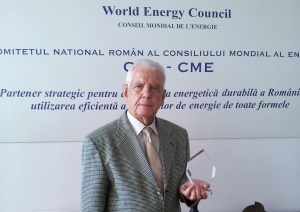Dr Gheorghe Balan graduated the Institute of Energy in Ivanovo, Russian Federation, in 1955, with a doctorate obtained at the Polytechnic Institute in Bucharest. He began his professional activity in 1955, at the Bucharest Electric Power Distribution Corporation (IDEB). Since 1960 he has overseen various senior management positions: General Manager of IRME (1960-1971), Chief Engineer at Energoreparatii (1972-1973), Scientific Director, Director of Programs, Director of a complex project at ICEMENERG (1974-2000), with personal achievements and contributions in issues related to applied research, commissioning, energy quality, nuclear power.
Dr Balan worked in parallel as a teaching assistant, as a university assistant, a head of works, a member of the Professor's Board of the Faculty of Power Engineering and a member of doctoral commissions, and between 1960 and 1988 he was the representative of Romania in the CAER Committee for Energy.
He has also published many articles and studies in national and international journals. Dr Balan has been a member of prestigious national and international bodies including the Energy Academy of the Romanian Academy and Council for Science and Technology (CNST). Since 2000 – 2017 he was the General Executive Director of Romanian National Committee of the World Energy Council.
What have been your main highlights during your tenure as General Executive of the Romanian member committee?
As Executive Director, I was pleased to oversee many new activities set up and implemented between May 2000 and November 2017. The committee has developed new collaborations with universities and academies in Romania and Moldova including the Romanian Academy and the Technical University of Moldova and Institute of Energy of the Academy of the Republic of Moldova.
Since 2000, the committee has produced many new publications including monthly magazine Mesagerul Energetic and our annual report.
We are actively involved in and organise a number of events per year, in particular our Regional Energy Forum in Central and Eastern Europe. The program comprises 11 important individual events, five of dialogue sessions and panels, as wells 40 - 50 exhibition booths, among other social and cultural activities.
I am pleased to say we have increased the number of our corporate members from 7 in the year 2000 to more than 90 members in the year 2016. Our individual membership also increased from 23 in the year 2000 to more than 400 members in the year 2017.
We have a very active Future Energy Leaders’ programme in Romania since 2011 which has enabled us to integrate Romania's young professionals in World Energy Council’s activities and create opportunities for promoting our members at an international level. Since 2011 our FELS have successfully forged partnerships with prominent organisations and provide a platform for communication and cooperation between the new generation and the current elite in the energy field.
I am particularly proud of the Romanian FELS Trends & Technology monthly newsletter which not only informs readers about activities involving our local network and the latest FELS news, but valuable insights and news and issues facing the international energy scene.
How has the Romanian MC contributed to the European and global energy sector and transition?
By establishing and strengthening the collaboration relationships with other World Energy Council member committees in Central and Eastern Europe accomplished through the participation of the Council's member committees' top executives at events organised by the Romanian committee.
Our member committee has continuously contributed to the Romanian national Energy Strategy. The outcomes conclusions and recommendations of our involvement in FOREN as well as additional and annual member committee events and reports such as the World Energy Issues Monitor, are submitted to government and prominent decision-making bodies within the sector on a regular basis. Our expert members continue to bring their valuable specialist insights and experience whenever they have been invited to contribute to strategic energy guidelines and policies.
What will you miss the most?
I will miss planning events and consulting with my fellow colleagues. I will also miss participating in the WEC Study Groups meetings, where one could hear all kind of innovating ideas.






